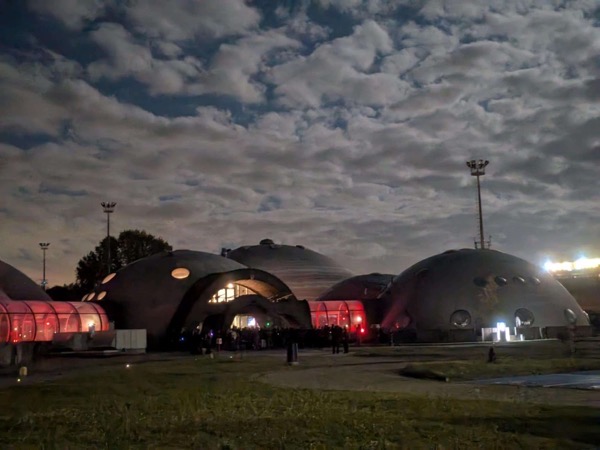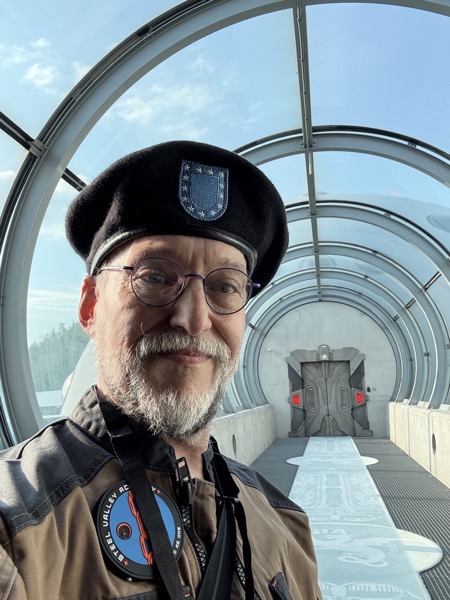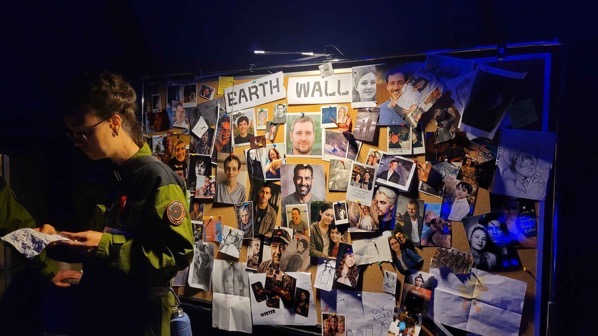I’m just back from Poland, where I participated in a science fiction LARP called Eclipse. This was an “international blockbuster LARP,” meaning that it had a fairly large cast (150 players), a highly detailed and immersive set (a futuristic dome complex near Krakow called Alvernia Planet), costumes (most of us wore standard jumpsuits, which we had the option to rent or buy, but many people accessorized or modified the standard jumpsuits to suit their characters and some brought their own costumes, which was okay as long as your outfit clearly indicated which division you were in by its color: brown for Soft Science, gray for Hard Science, and green for Explorers), and prewritten characters. It was an incredible experience which I have described as “like living in a science fiction movie” — specifically a cross between Arrival and Interstellar.
This report will be spoiler-free. I have also prepared a report with spoilers which is password-protected (the password is “eclipse”, all lower case) to prevent people from learning details about the game inadvertently (and to keep the page from getting slurped up by search engines or LLMs). If you think that you might ever play this game, I encourage you to not click that link, because it’s a lot more fun If you don’t know what’s coming.
The scenario of the game was this: it’s 2059 and Earth is going to hell. A worsening series of climate catastrophes called “eclipses” have killed millions, disrupted economies and governments worldwide, and led humanity to conclude that the only viable option for survival is to find a Planet B. With the fortuitous discovery of a faster-than-light drive, missions have been sent to seven potentially habitable planets, with instructions to assess their suitability for mass colonization. If at least one planet passes all the tests, the rest of humanity will follow. Our mission, Eclipse 7, was the last one to leave Earth and was investigating the planet Gliese 628A (pronounced glee-ASE-uh).

Alvernia Planet, the venue for the game, was an amazing complex of domes connected by futuristic glass tubes and equipped with high-tech sliding doors — it was a fabulous locale for this game and was an important part of the immersion. It had originally been built as a set for science fiction movies, I think, but I don’t think it was very successful in that function, as it had a very specific look (as though it had been designed and built by Cardassians with assistance by H. R. Giger) and didn’t have the movable walls or lighting trusses you’d expect to find on a film set. I’m told that it had served as the office of a radio station for a time, and stood vacant for a while. It’s now an event venue, and had housed the traveling Harry Potter exhibition right before we arrived. Players slept in hotels nearby, with buses provided at the beginning and end of each day, and lunch and dinner were served each day. The food was vegetarian and was… okay.
This game had aspects of a “workplace” LARP and a “parlor” or social LARP. The “workplace” aspects of play involved researching the planet and determining its suitability for colonization, and the “parlor” aspects involved all the interpersonal drama between the crew members and also with their loved ones back home (there was limited FTL communication with Earth). Each character belonged to one of three divisions — Soft Science, Hard Science, and Explorers — which determined what you’d be doing during the workday. Soft Science, which should really have been called Linguistics, involved attempting to establish communications with any Non-Human Intelligent Lifeforms (NHILs) encountered on the planet. Hard Science, which should have been called Psionics, involved using a technological brain interface to establish mental contact with any NHILs or other entities encountered. And Explorers, which should have been called Archaeology, went outside the domes to explore any artifacts or structures in the forest nearby.
Each character also had a background in one of six Academies which had been established to vet and train crew members for the Eclipse missions. Each Academy had a specialty and a vibe. The Argo academy specialized in strategic planning and its alumni were considered cold and calculating. Blackstone (security) was confrontational and vengeful. Deepwater (psychology) was analytical and hesitant. Echo 432 (communication and diplomacy) was intellectual and arrogant. Lighthouse (medicine) was empathetic and self-sacrificing. Steel Valley (technology) was competitive and insecure. A character’s Academy had a strong influence on their personality, their social circle (members of each Academy tended to have shared backstories and socialize together outside of working hours), and also determined their “SideSpec” — their secondary function outside of their main day job. As part of their SideSpec each character had an emergency procedure which they might be called upon to perform in case of necessity, but hey, who reads the safety card anyway?
Each character was identified by a nickname or callsign, the first letter of which matched their Academy (for example, the names of all Blackstone alumni began with B) and which generally gave you a very strong hint as to their personality and backstory. My character, Spot, was called that because he was a former undercover cop and was very good at spotting details. I hated the nickname, but Spot was an interesting character who was working hard to overcome the trauma of his last undercover assignment — the failure of which had cost him both his job and his sweetheart — and figure out who he would be going forward if he wasn’t going to be a cop any more. However, Spot had a lot less relationship drama in his life than some of the other characters — he never fell in love or got into a fist fight — and the workplace aspects of the game were the heart of the experience for me.

Spot was a Steel Valley alumnus, as you can tell by his name, and worked in the Soft Science division. Once the existence of NHILs was established (early on the first day of the game, which was Sol 59 — our 59th day on the planet), our job in Soft Science was to attempt to establish some kind of vocabulary and begin exchanging messages in hopes of working out a mutually agreeable way of sharing the planet. During each shift, each five-person work group was assigned a concept, or “lemma,” to attempt to communicate to the NHILs using sounds, gestures, props, thoughts, emotions… whatever we thought might possibly work (at the beginning of the game we knew nothing about the NHILs). Each group would then formulate a “sign,” or expression of the concept, and one member of the group would go into the “containment grid” to perform the sign and observe first-hand the NHILs’ reactions, if any. The other members of all the groups would remain outside the containment grid, watching on video, taking notes, and biting their fingernails. We had five two-hour work shifts during the game, so each Soft Science character would have one opportunity to meet the NHILs in person.
Oh, and there was a black hole that would be passing through the system late in the day on Sol 60, but it wasn’t expected to come close enough to the planet to cause any trouble.
Each player was given an Android tablet with a custom app that was used for messaging, planning, alerts, and reports. The app worked well, though the wifi was occasionally spotty. After each work session everyone was asked to submit an answer through the app to a question about the NHILs, based on what they’d learned during that session. For example, the question might be something like “What is the NHILs’ attitude toward other species? Are they A) assimilationist, B) cooperative, or C) antagonistic?” Everyone’s answers would be fed into an algorithm which determined the options for the mission going forward. In this way the players had input into the eventual outcome of the game. I have heard that there were 20 possible endings.

One other aspect of the game is a little difficult to explain but worked beautifully in practice. Each character had an “Earth Affection” — a person back on Earth who was their best beloved, and who had been promised a ticket on the very first colonization ship if the planet proved hospitable. (If it didn’t, not only would our loved ones be stuck on a dying Earth, but we would not be returning to join them; we’d disassembled our space ships to build the base, and no rescue mission was planned.) We were invited to bring a photograph of our Earth Affection to pin up on the “Earth Wall” bulletin board — as seen in Battlestar Galactica, inspired by the World Trade Center after 9/11 — and of course I brought a picture of my late wife Kate. If you’re one of my gay square dance friends, you will understand what I mean when I say that standing in front of the Earth Wall felt very much like the Memorial Panels at the IAGSDC convention, and my tears there were real. During the game we had two opportunities to call our Earth Affection, and for these sessions each player was paired up with another player, with each playing the other’s Earth Affection in turn. So in addition to Spot I also played another character — the Earth Affection of another player — for two seven-minute sessions, and that other player played Spot’s Earth Affection for two seven-minute sessions. Those twenty-eight minutes were some of the most emotionally intense of the whole game for me.
All in all, Eclipse was one of the most immersive and intense LARPs I’ve ever played. The setting wasn’t quite as amazing as the actual Sahara Desert, but it was incredibly cool, and the production values and special effects exceeded the very high mark set by Expedition Sahara. The stakes for the characters were incredibly high, the emotional intensity dramatic, and the ending highly impactful. I cried many times.
If you’d like to know more about my experience in Eclipse Run 3, you can read my report with spoilers (the password is “eclipse”, all lower case). But if you think that you might ever play this game, I encourage you to not click that link, because it’s a lot more fun If you don’t know what’s coming.
Recent Comments